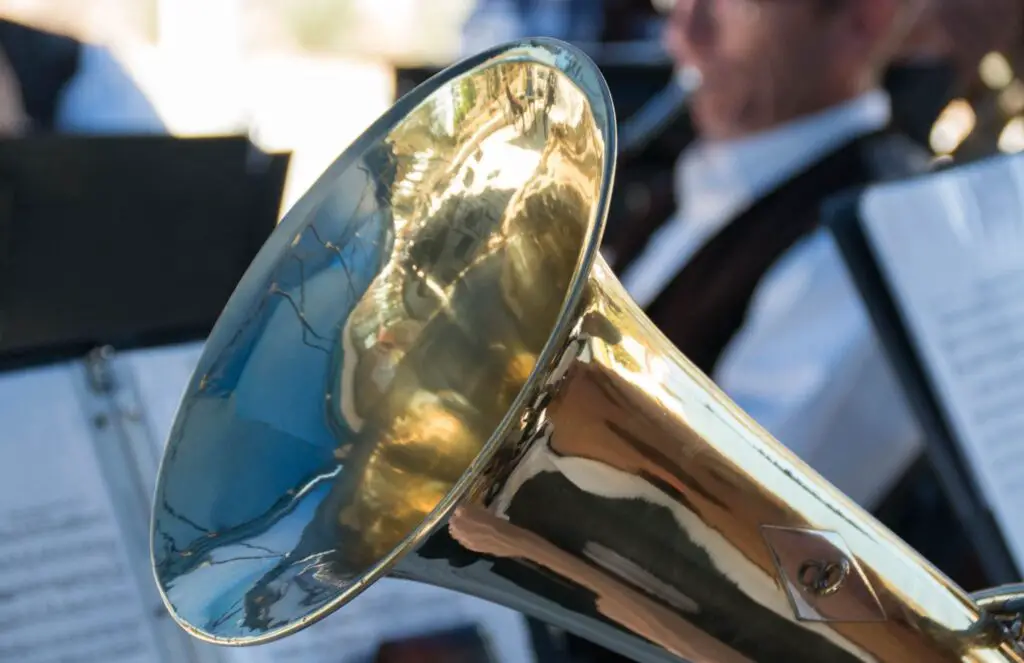Most musicians that have been in band have heard of a baritone and euphonium, but very few could tell you the difference. Both instruments have a rich sound that can add depth to any ensemble…but if you are looking to get in to composing music that might feature one (or both) of these instruments, there are a few things that should be clarified, namely, what’s the difference between a baritone and a euphonium?
Generally, the main difference between a baritone and euphonium is the type of bore each instrument has. A euphonium has a conical-bore, while the baritone has a cylindrical-bore. This difference gives the euphonium a richer, more mellow sound while the baritone has a brighter, punchier sound.

You’ll find that many wind and brass instruments in band or orchestra will be either conical bore or cylindrical bore. This is the main difference between baritone and euphonium and contributes greatly to the overall sound and timbre that the instruments produce.
- Conical Bore – The bore of the instrument gradually gets wider as you go from the mouthpiece to the bell.
- Cylindrical Bore – The instrument has a constant width throughout its length.
Do Baritones And Euphoniums Have Other Differences?
Aside from bore size, there are other noticeable differences between the baritone and euphonium:
- Euphoniums are a larger instrument than the baritone and therefore requires more air to play.
- The euphonium also has a wider range than the baritone, spanning four octaves compared to the baritone’s three and a half octaves.
- Euphoniums usually have four valves, baritones only three.
- Euphonium valves are located in a straight line, while the baritone’s valves are typically arranged in a fan pattern.
- Baritones will usually play in treble clef (concert band) and euphoniums play in bass clef.
Is Baritone Easier Than Euphonium?
Typically, players will learn the baritone before they learn the euphonium but the two instruments are equally challenging to learn. Since the euphonium is more often featured in solo work, the overall scope of music could be considered more challenging than music written specifically for baritone.
Since the euphonium has a more mellow sound, similar to the tuba, more composers will write solos featuring the euphonium. On the other hand, a lot of marching and brass band pieces will prefer to have baritones since their sound can cut through other instruments more easily.
Don’t get me wrong, the euphonium can produce big, brassy sounds…it’s just more associated with a smooth and mellow sound.

Should I Buy A Baritone Or Euphonium?
Students will be encouraged to play the baritone or euphonium by their schools music instructor since different bands will utilize different instruments. In many cases, the euphonium will become a separate section in the band, with the baritone becoming an auxiliary instrument for trombone players.
If you are looking for an instrument to play in a marching band then baritone is probably your best bet. However, if you want an instrument that can be used in a euphonium ensemble, tuba-euphonium, or symphonic band, then euphonium is probably the way to go.
Once you get to the college level of playing, baritones are rarely seen unless a specific piece of music calls for it…and in these cases the part will be played as a “doubling*” instrument by a trombone player (sometimes a french horn player)…or if you’re looking on the field at the marching band.
*A doubling instrument is an instrument that a player performs on in addition to their primary instrument. For instance, many saxophone players will double on flute and/or clarinet.
Euphoniums are also a great choice for solo work since there is a greater repertoire of music written specifically for euphonium. If you are looking for an instrument to play in a symphonic band then euphonium would be my recommendation.
When Is A Baritone Used?
Baritones are mostly associated with lower grade level band music and marching bands. However, they can also be found in jazz, rock, ska, and some modern orchestral music.
Baritones are a great choice for composers wanting to compose marches, brass band pieces, or music that needs a brassy tenor/baritone voice that can cut through other instrument sections.
Popular tunes that feature the baritone:
- Stars and Stripes Forever
- The Lord of the Rings (De Meij)
When Is A Euphonium Used?
The euphonium is mostly found in higher grade level concert bands, symphonic bands, and tuba-euphonium ensembles but can also be found in marching bands and brass bands.
Euphoniums are often used as a solo instrument thanks to it very mellow and smooth sound. Like the baritone, it has also made appearances in a variety of other genres like jazz, rock, and orchestral music.
Popular tunes that feature the euphonium:
- The Lonely Bull
- The Lord of the Rings (De Meij)
- Second Suite in F for Military Band
You’ll notice some overlap there, namely The Lord of the Rings. This is because it…and many other pieces written for concert band…will offer choices that accommodate ensembles of different instrumentation and to let the director have some tonal choices.
Are Baritone And Euphonium Mouthpieces The Same?
Euphoniums and baritones will often use the same mouthpieces.
Baritones and euphoniums usually have similar sized mouthpiece receivers..called a “shank”…so that the same type of mouthpiece can be used on both.
However, some companies like Yamaha will make euphonium specific mouthpieces that have a slightly smaller inner rim diameter. This is to help the player produce a more focused sound.
